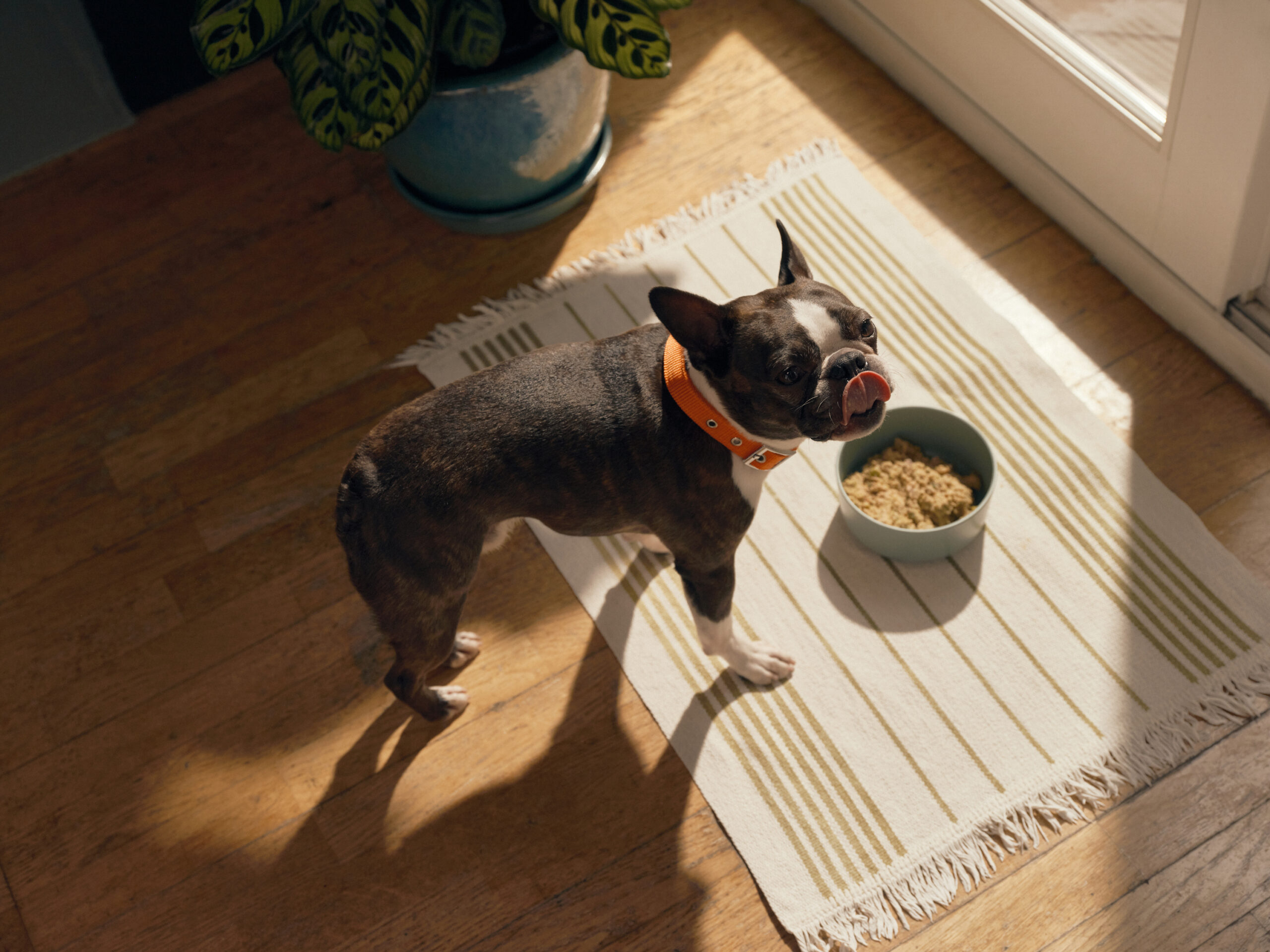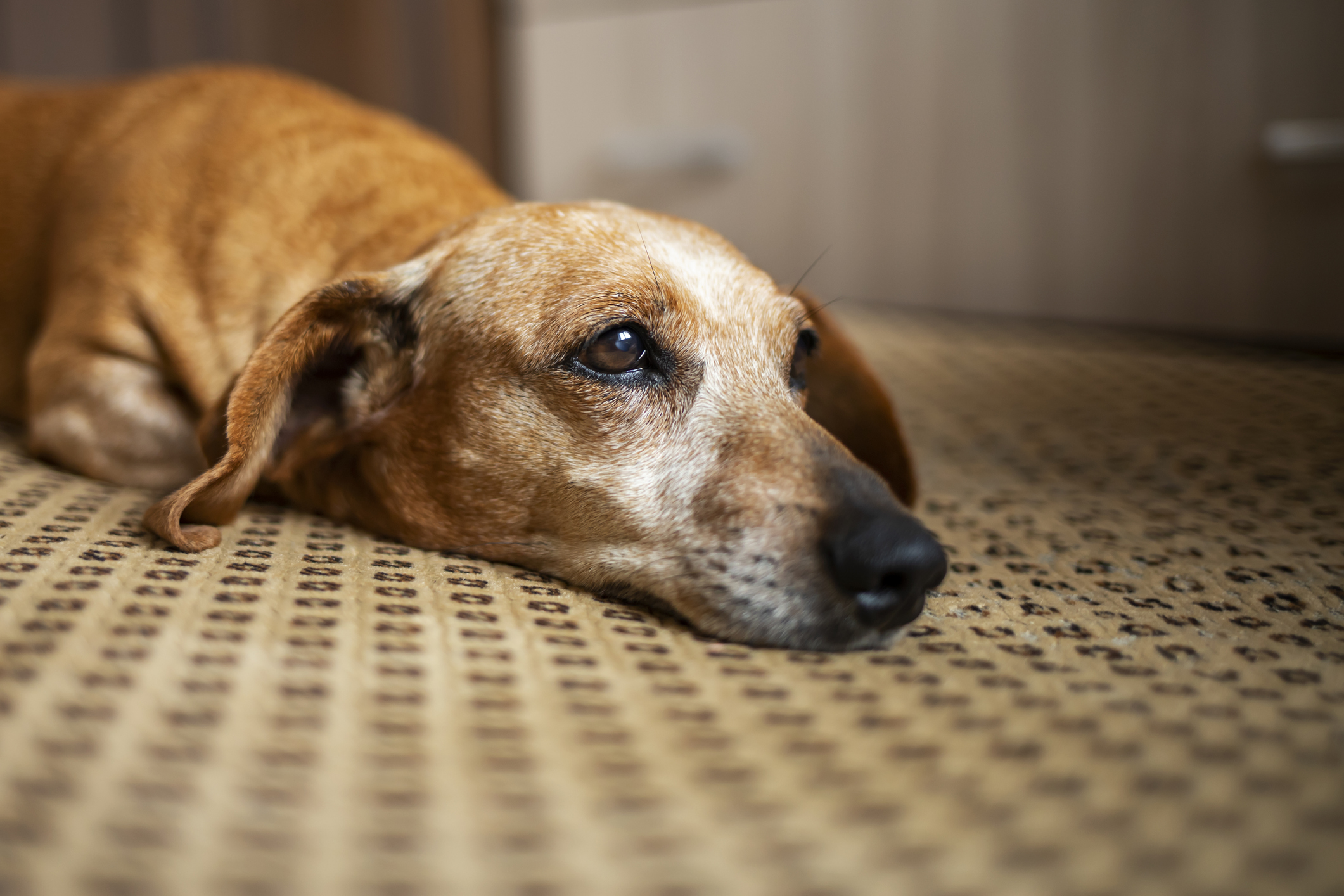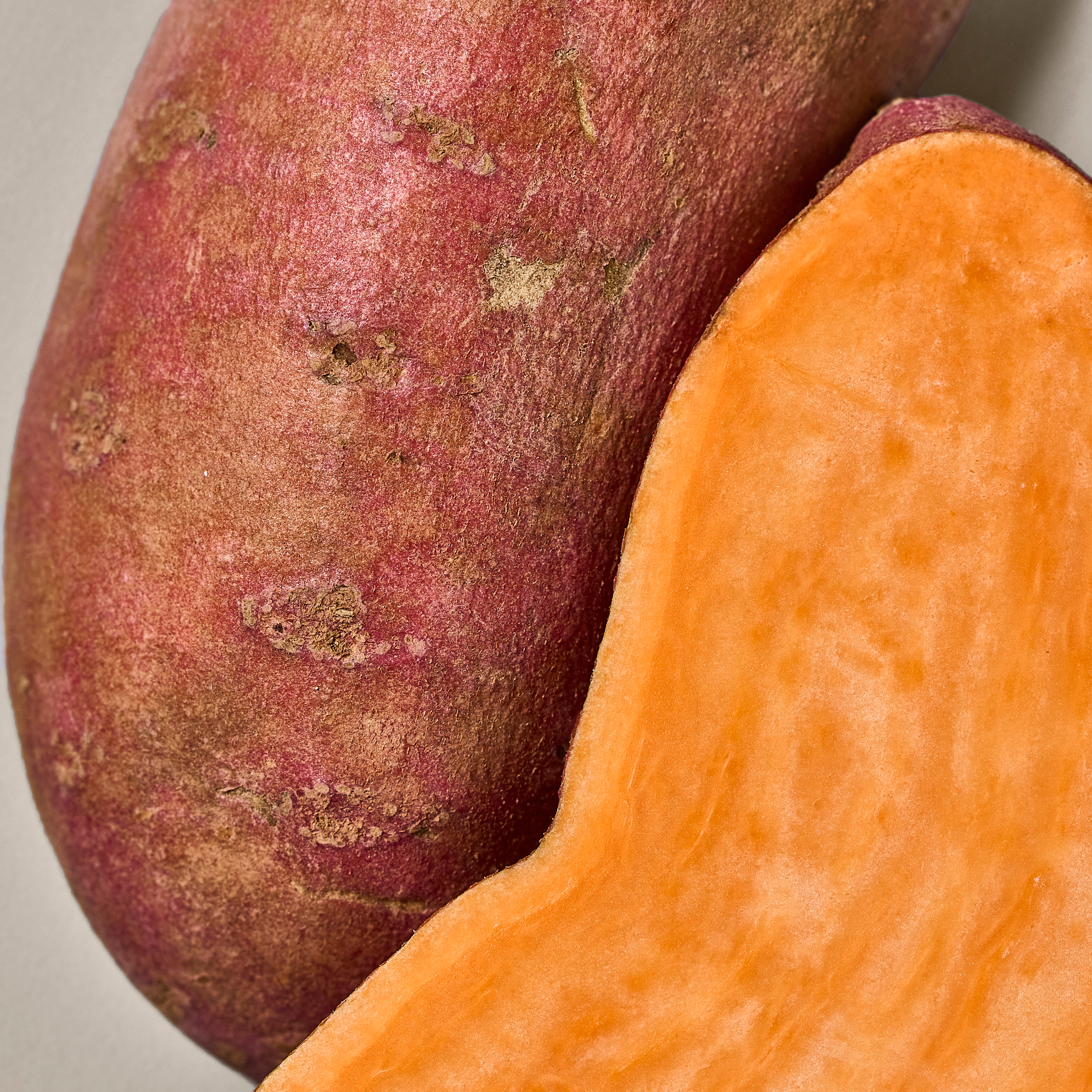Hey Ollie blog readers! We’re offering you an exclusive 60% OFF your starter box! Try now!
You wake up to an accident on the floor—or maybe you come home from work and notice your older dog’s not quite acting like themselves. A loose stool here or there might not be alarming in a younger pup. But when it’s your senior dog, it feels different. More serious. More urgent.
Senior dog diarrhea is common, but that doesn’t mean it should be ignored. As dogs age, their digestion changes. Their immune systems slow down. And their tolerance for stress, new foods, or medications isn’t what it used to be.
The good news? There are steps you can take right away to help your dog feel better—and keep things from getting worse.
In this guide, we’ll walk you through:
- What causes diarrhea in older dogs
- How to treat mild cases at home
- When to call your vet
- How to adjust their diet to avoid future flare-ups
We’ll also share how Ollie gently cooked, highly digestible meals can help support gut health—especially in senior dogs with sensitive stomachs.
Let’s start by understanding why older dogs are more prone to digestive issues in the first place.
Why Older Dogs Are More Prone to Diarrhea
Just like people, dogs go through physical changes as they age—and many of those changes start in the gut.
Senior dogs are more prone to diarrhea for a few key reasons:
1. Weakened Digestive Function
As dogs get older, their digestive systems slow down. They may not break down food as efficiently, and their ability to absorb nutrients can decrease. That can make them more sensitive to rich foods or sudden changes in diet.
2. Decreased Gut Microbiome Diversity
Healthy digestion relies on a balanced gut microbiome. In aging dogs, the diversity of beneficial gut bacteria tends to decline, which can lead to loose stools and inconsistent digestion.
3. Increased Medication Use
Many senior dogs are on daily meds for arthritis, heart disease, or other chronic conditions. Some medications, especially anti-inflammatories or antibiotics, can irritate the stomach or disrupt the gut lining, leading to diarrhea.
4. Greater Sensitivity to Stress or Food Changes
An upset routine, a new food, or even a different treat can throw off an older dog’s digestive rhythm more easily than it would in a younger dog. Their systems just aren’t as resilient.
Dr. Lisa Lippman, DVM, explains, older dogs often have less resilient GI tracts, making them more susceptible to upset. Even something as simple as a small diet change can trigger diarrhea in a senior pet.
That’s why consistency is key, and why many pet parents turn to fresh, gently cooked meals from Ollie. Our food is made with whole, real ingredients that are easier to digest and free from the common triggers found in many commercial kibbles.
Common Causes of Diarrhea in Senior Dogs
When an older dog suddenly has diarrhea, it’s easy to assume it’s something they ate—but there are actually several potential triggers. Understanding the cause can help you respond faster and prevent it from happening again.
Here are the most common causes of diarrhea in senior dogs:
1. Dietary Indiscretion
Dogs don’t always lose curiosity with age. Getting into the trash, sneaking table scraps, or chewing something outside can quickly lead to an upset stomach.
2. Sudden Diet Change
Older dogs are especially sensitive to new foods. Switching kibble brands or introducing a new treat without a slow transition often causes loose stools.
3. Food Sensitivities or Allergies
With age, some dogs develop intolerances they didn’t have before. Common triggers include beef, chicken, dairy, or grains. Even something they’ve eaten for years can start to cause issues.
4. Bacterial, Viral, or Parasitic Infections
Giardia, Salmonella, and other pathogens can still affect senior dogs, especially if their immune system is compromised. Contaminated water or food is a common culprit.
5. Chronic Conditions
Diseases like inflammatory bowel disease (IBD), pancreatitis, liver disease, or kidney dysfunction are more common in older dogs and can lead to recurring diarrhea.
6. Stress or Anxiety
Changes in routine, a new home environment, or the loss of a companion can lead to stress-induced diarrhea. Older dogs may struggle more with transitions or separation.
7. Side Effects from Medications
NSAIDs, antibiotics, and even some joint supplements can irritate the gut lining. Always watch for digestive changes when starting a new prescription.
8. Cancer or Tumors
In some cases, gastrointestinal tumors or systemic cancers can affect how your dog processes food. If diarrhea is frequent, accompanied by weight loss or loss of appetite, it’s worth investigating further.
When to Call the Vet: Warning Signs to Take Seriously
A mild case of diarrhea might pass on its own—but with a senior dog, you never want to wait too long. Older dogs can become dehydrated or weakened more quickly than younger dogs, especially if they already have health issues.
Here’s how to tell when your senior dog’s diarrhea needs a vet’s attention:
Call Your Vet If You Notice:
- Diarrhea that lasts longer than 24–48 hours
- Blood or mucus in the stool
- Vomiting in addition to diarrhea
- Lethargy, weakness, or collapse
- Refusal to eat or drink
- Dry gums, sunken eyes, or signs of dehydration
- Sudden weight loss
- Known medical conditions (kidney disease, diabetes, cancer, etc.)
According to the American Animal Hospital Association (AAHA), dogs over the age of 7 are at higher risk for complications from even minor illnesses. Diarrhea in a senior dog should always be taken seriously, especially if paired with other symptoms.
What to Tell Your Vet:
- How long the diarrhea has lasted
- Any recent changes in food, treats, or routine
- Other symptoms (vomiting, fatigue, lack of appetite)
- Current medications or supplements
- Stool color and frequency
Bringing this info to your appointment helps your vet diagnose faster—and treat more effectively.
Pro tip: If your dog’s diarrhea is frequent or recurring, consider keeping a food log and symptom tracker. It can help identify patterns—and support your vet in getting to the root cause.
At-Home Steps for Managing Mild Diarrhea
If your senior dog has mild diarrhea but is still eating, drinking, and acting mostly normal, there are a few safe things you can do at home to help their system settle.
Here’s how to support gentle recovery:
1. Consider a Short Fasting Period (If Your Vet Agrees)
Giving the digestive system a short break can help. For many dogs, withholding food for 12–24 hours may give their gut time to rest and reset. Make sure they still have access to fresh water during this time.
Note: Fasting isn’t always recommended for senior dogs with certain health conditions (like diabetes). Always check with your vet first.
2. Offer a Bland Diet
Once the diarrhea slows down, ease your dog back into eating with simple, digestible foods like:
- Plain boiled chicken (no skin, no seasoning)
- Cooked white rice
- Canned plain pumpkin (not pumpkin pie filling)
- Plain bone broth (low sodium)
Feed in small, frequent portions. If tolerated, you can slowly transition them back to their regular diet over 2–3 days.
3. Keep Them Hydrated
Even mild diarrhea can lead to dehydration, especially in older dogs. Add water to their meals or offer low-sodium broth to encourage fluid intake.
4. Add a Dog-Safe Probiotic
Probiotics help restore healthy gut bacteria and may reduce how long the diarrhea lasts. Look for vet-approved options, or use a digestive chew that includes probiotics (like Ollie Probiotic Chews).
5. Monitor Closely
Keep track of:
- Stool consistency and frequency
- Appetite and energy levels
- Any new symptoms (vomiting, trembling, etc.)
If the diarrhea doesn’t start improving within 24–48 hours, or if anything else feels off, give your vet a call.
Ollie fresh meals are made for sensitive stomachs, with real, whole-food ingredients that are easy to digest. Many dog parents notice firmer stools and fewer digestive issues after switching to gently cooked food that skips the fillers and preservatives found in many kibbles.
How Nutrition Impacts Digestive Health in Senior Dogs
When it comes to preventing diarrhea in senior dogs, what they eat, and how it’s prepared, makes a big difference.
Older dogs have more sensitive systems. Their digestion slows down, their stomach linings may thin, and they often have a harder time handling artificial ingredients or excess fat. That’s why feeding them a diet that’s gentle and nutrient-dense is one of the most effective ways to support gut health.
Key Nutrition Factors That Affect Senior Digestion:
Highly Digestible Proteins
Senior dogs do best with clean, cooked animal proteins (like chicken, beef, or turkey) that their bodies can easily absorb.
Moisture-Rich Meals
Hydration is crucial for older dogs, especially those prone to digestive issues. Fresh food with natural moisture supports easier digestion and better nutrient absorption.
Simple, Limited Ingredients
Avoid ingredient lists packed with fillers, preservatives, and mystery meat meals. The more processed the food, the harder it is to digest.
Balanced Fiber
Too much or too little fiber can cause digestive upset. A moderate amount from whole food sources (like sweet potatoes or pumpkin) helps regulate stool consistency.
Why Ollie Works for Sensitive Seniors
Ollie fresh food is crafted with senior dogs in mind:
- Gently cooked to retain nutrients and boost digestibility
- Made with limited ingredients you can actually recognize
- Customized portions based on your dog’s age, breed, and activity level
- No by-products, no fillers, no preservatives
For senior dogs dealing with recurring diarrhea, switching to a simpler, cleaner diet is often the first step in long-term relief.
What If Diarrhea Keeps Coming Back?
Occasional diarrhea is one thing. But when it becomes a pattern, especially in older dogs, it’s time to dig deeper.
Recurring diarrhea in senior dogs often points to an underlying issue that food alone won’t fix. That doesn’t mean it’s serious—but it does mean your vet should get involved.
Possible Causes of Chronic Diarrhea:
- Inflammatory bowel disease (IBD)
- Pancreatitis
- Liver or kidney disease
- Intestinal parasites or infections
- Endocrine disorders like Addison’s or thyroid disease
- Cancer or tumors in the digestive tract
Even mild cases that keep returning can lead to nutrient deficiencies, weight loss, or dehydration over time.
Diagnostic Tools Your Vet May Use:
- Bloodwork
- Stool analysis
- Food allergy testing
- Imaging (X-rays or ultrasound)
- Biopsy (in more serious cases)
Long-Term Diet Strategies
If chronic diarrhea is diet-related, your vet may recommend:
- An elimination diet to identify triggers
- A prescription diet for GI support
- Transitioning to a fresh, limited-ingredient food with fewer additives
That’s where Ollie can help. Our gently cooked meals are free from common triggers like fillers, by-products, and artificial additives. They’re built to be simple, clean, and easy on sensitive systems—especially in aging dogs who need stability more than ever.
Chronic diarrhea doesn’t have to be your dog’s new normal. With the right diagnosis and daily care, most senior dogs can get back to feeling better, and going regularly.
FAQs About Senior Dog Diarrhea
Is diarrhea normal in older dogs?
Occasional diarrhea isn’t unusual in senior dogs, but it’s not something to ignore. Aging digestive systems are more sensitive, and even small changes in food, routine, or stress can trigger loose stools.
What’s the best food for senior dogs with sensitive stomachs?
Look for fresh, gently cooked meals made with limited ingredients—like Ollie’s fresh food, which is tailored to support digestion with no fillers, by-products, or artificial additives.
Can stress cause diarrhea in senior dogs?
Yes. Older dogs may be more affected by changes in routine, travel, new pets, or separation anxiety. Stress can lead to short-term digestive upset, including soft stools or diarrhea.
Should I fast my senior dog if they have diarrhea?
In mild cases, a short fast (12–24 hours) may help the gut reset—but always check with your vet first. Some senior dogs, especially those with medical conditions, may not tolerate fasting well.
When is diarrhea an emergency for a senior dog?
Call your vet if the diarrhea lasts more than 24–48 hours, includes blood or vomiting, or if your dog shows signs of dehydration, lethargy, or stops eating.
Tagged As:

The nutrition your dog needs,
the food they want.

Enjoying our articles? Subscribe our Newsletters and get new articles directly to your inbox
You might also like
30 July 2025
6 MINS READ
Fresh Dog Food for Picky Eaters: A Tasty Solution
Feeding a picky eater can feel like an unsolvable riddle. One day your dog is happily chowing down, and the next, they turn their nose up at the exact same food. If you’ve found yourself trying …
by Ollie Pets
30 July 2025
6 MINS READ
Top Nutrition Tips for Dogs with Digestive Issues
Watching your dog struggle with an upset stomach, diarrhea, or gas is difficult for any pet parent. Digestive issues are common, but the good news is that the right nutrition can make a world of d…
by Ollie Pets
30 July 2025
6 MINS READ
Ingredients to Support Healthy Digestion for Dogs with Sensitive Stomachs
As a dog parent, seeing your pup struggle with gas, loose stools, or vomiting can leave you feeling helpless and worried. The good news is that one of the most powerful tools for managing a sensit…
by Ollie Pets







